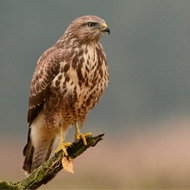
Announcement criticised by the RSPB
Natural England has issued a licence that allows landowners to shoot buzzards ‘to prevent serious damage to young pheasants’.
The news has been criticised by the RSPB, who argue the decision sets a worrying precedent.
"The killing of a recovering British bird of prey to protect an introduced gamebird for the benefit of commercial interest is wrong," said RSPB's conservation director, Martin Harper. "What will be next? Red kites, peregrines, hen harriers?"
In a statement, Natural England said: "The licence is time-limited with stringent conditions and is based on the law, policy and best available evidence. It follows rigorous assessment after other methods had been tried unsuccessfully over a 5-year period."
"It is stipulated that the licence must be used in combination with non-lethal measures and only on buzzards in and immediately around the animal pens - not on passing birds."
But Mr Harper claims the legal framework behind the decision is broken and that there should be a public debate on the matter.
"There needs to be a public policy debate about how can it be right that as a growing number of gamebirds are released, a protected bird of prey is in the firing line to safeguard a shootable surplus of pheasants.
"Forty-five million pheasants and six million red-legged partridge are released into the countryside each year. We don’t know what the ecological consequences of this introduction are but it’s hardly surprising that it attracts predators."
He adds: "The loss of some of these gamebirds is an inevitable consequence of doing business. Natural predators should not be bearing the cost in this instance. What we really need is the gamekeeping industry to identify ways in which they can live alongside buzzards and invest in protecting their poults without resorting the lethal control."
Buzzards are the UK's most common bird of prey and were once almost hunted to extinction.
In recent years, however, buzzards have made a huge comeback. Today, the RSPB estimates there to be some 57-000-79,000 breeding pairs.



 The Veterinary Medicines Directorate (VMD) is inviting applications from veterinary students to attend a one-week extramural studies (EMS) placement in July 2026.
The Veterinary Medicines Directorate (VMD) is inviting applications from veterinary students to attend a one-week extramural studies (EMS) placement in July 2026.